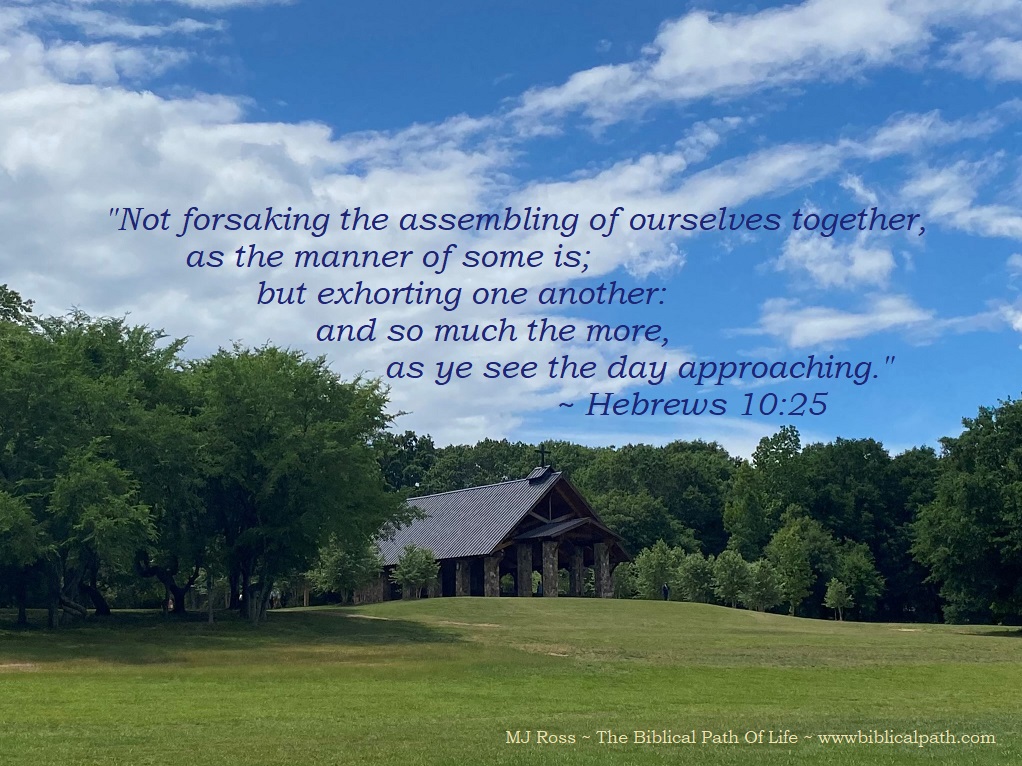
“Not forsaking the assembling of ourselves together, as the manner of some is; but exhorting one another: and so much the more, as ye see the day approaching.”
Hebrews 10:25
Jesus’ earthly parents took Him to the Temple when He was a child, and He continued to go as an adult. He not only went to the Temple, but also the synagogue. The synagogues had become common places of Bible teaching and worship. They were started during the Babylonian captivity. Because the people had no Temple in which to worship God, they began to meet in smaller groups for worship and biblical instruction. According to Jesus’ actions, He not only went to the synagogue regularly, but He taught there often as well.
Jesus’ parents took Him to the Temple the first time shortly after He was born (see Luke 2:27). They took Jesus to the Temple when he was twelve years old (see Luke 2:46). When Jesus was an adult, He still went to the Temple and the synagogue often. “And he came to Nazareth, where he had been brought up: and, as his custom was, he went into the synagogue on the sabbath day, and stood up for to read” (Luke 4:16). It was His custom. There are dozens of verses in the Gospels declaring Jesus went to the synagogue and the Temple.
Do you remember what often happened when Jesus went to the synagogues? Or even the Temple? When he went to the synagogue in his hometown of Nazareth where He read a portion out of Isaiah, see what the people did. “28. And all they in the synagogue, when they heard these things, were filled with wrath, 29. And rose up, and thrust him out of the city, and led him unto the brow of the hill whereon their city was built, that they might cast him down headlong” (Luke 4:28-29). Not only were they angry with Jesus, they wanted to throw Him off of a cliff to kill Him. “But he passing through the midst of them went his way” (Luke 4:30). Nevertheless, Jesus did not quit going to the synagogue or the Temple. When He went, He often taught the people. When Jesus taught, He made known the need for repentance of sin. The people would then be given the choice – to accept Him or reject Him.
See a few of the following examples:
- A ruler of the synagogue believed in Jesus to heal his daughter (see Mark 5:22-24, 35-43).
- The people did not believe in Jesus (see Mark 6:2-6).
- The people of Jesus’ hometown of Nazareth rejected Him, wanting to kill Him (see Luke 4:16-30).
- Jesus taught in the Temple, and many did believe on Him (see John 7:28-31).
Because Jesus went to the Temple and synagogues often, many of the religious leaders heard and believed in Jesus. “Nevertheless among the chief rulers also many believed on him; but because of the Pharisees they did not confess him, lest they should be put out of the synagogue” (John 12:42).
Today, we do not go to the Temple, for it has been replaced for Christians with the church building. The church building is the place that Christians go to meet in smaller groups for worship and biblical instruction. (Did you notice that was the same function as the synagogue?) Because Jesus found it important to go to the synagogue often, many recognized who Jesus was during the gathering of people in those locations. It was there that God’s Word was taught. Today, Christians are to attend church often. “Not forsaking the assembling of ourselves together, as the manner of some is; but exhorting one another: and so much the more, as ye see the day approaching” (Hebrews 10:25). Not only are we to attend church to learn more about the Bible, helping us to become better Christians, but for much the same reason that Jesus often visited the Temple and the synagogues – to encourage and teach others about Jesus.
Admittedly, today’s churches are sometimes difficult places to attend regularly. There are obviously problems in some churches. It may even be difficult to find a true Bible believing and teaching church. However, each Christian is encouraged to go more and more often, for time is short. The synagogues Jesus attended were fraught with religiosity. The leaders taught a religious system and tradition more than God’s Word. Jesus was often challenged, met with confrontation, rejected, and at times even attended at the peril of His life. Yet He continued to frequent them regularly. However, while He was there, He taught the truth. Sometimes He said, “as it is written”, and often He referred to what they had heard and told them, “I say unto you” to correct what they had heard.
Today, we have the complete written Word of God, and it is important that each Christian knows what the Bible teaches. When a Christian goes to church, one can be pretty confident that there is no fear of death. However, there may be challenges, confrontations, or even rejection. But that is no reason to quit attending church (maybe find a new one!). Jesus attended while He lived here on earth. Christians should be just as faithful, praying God will provide a Bible teaching church to attend. Paul encouraged the men he left in charge at the church in Ephesus. Remember what he taught them: “Take heed therefore unto yourselves, and to all the flock, over the which the Holy Ghost hath made you overseers, to feed the church of God, which he hath purchased with his own blood” (Acts 20:28). The church was purchased with the blood of Christ. It is very important to Him.
Have you found a Bible teaching church in which to attend faithfully?
